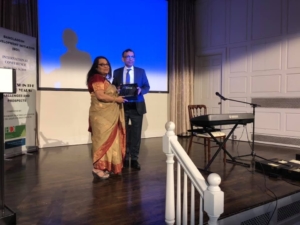 Dr. Munir Quddus, professor and dean of Prairie View A&M University’s College of Business, was born and educated in the South Asian country of Bangladesh. Since coming to the United States at the age of 22 to get his master’s and doctorate degrees, he has made it one of his life’s missions to work for the development of his home country.
Dr. Munir Quddus, professor and dean of Prairie View A&M University’s College of Business, was born and educated in the South Asian country of Bangladesh. Since coming to the United States at the age of 22 to get his master’s and doctorate degrees, he has made it one of his life’s missions to work for the development of his home country.
“I have a special interest in Bangladesh as a trained development economist,” said Quddus.
He took that interest and invested his time and efforts into the Bangladesh Development Initiative (BDI), a professional organization composed of independent scholars and professionals. He joined the organization in the 1990s, served on the editorial board of the Journal of Bangladesh Studies, BDI’s flagship publication, and became president in 2012.
“In the past, Bangladesh has been considered a ‘test case’ for a developing country, which was not expected to do well. The thinking was that if Bangladesh could succeed in breaking out of the ‘poverty trap’ to uplift its people, any nation, no matter how poor, could also do it. Decades later, the country is doing remarkably well, both economically and socially,” said Quddus.
This spring, some 135 participants from around the globe attended BDI’s conference at Yale University entitled Bangladesh in the Next 30 Years: Challenges and Prospects. In his welcome remarks, Quddus encouraged participants to celebrate the success of Bangladesh and, at the same time, not hesitate in asking tough questions for research topics and policymakers.
BDI founding member Dr. Ashraf Ali presented a brief history of the 30-year old organization that works as a think-tank and an advocacy group with an emphasis on the social and economic development of Bangladesh. He reminded his listeners that when BDI started in the 1990s, the per capita income in Bangladesh was at $1/day, whereas today it stands at $5/day.
According to a press release from the conference, “The plenaries, sessions, and panels shone a positive light on the uplifting story of the people of Bangladesh who are now clearly marching out of a history of poverty, conflict, and instability. There is no doubt that best is yet to come for this young nation.”
At PVAMU, Quddus has plans to teach a class on the economy of Bangladesh and take interested students to visit the country for global business experience.
In an interview with “The Daily Star,” he said, “The case for the future development of Bangladesh is strong. As scholars, we want to share the challenges and threats Bangladesh continues to face both internally and externally, but overall, I remain highly optimistic. The secret of success for Bangladesh and for any nation is the people. The citizens of Bangladesh have demonstrated time and again their ability to work hard and be resilient in the face of numerous threats and challenges.”
To learn more about the Bangladesh Development Initiative, visit www.bdiusa.org.
By Marchita Shilo
